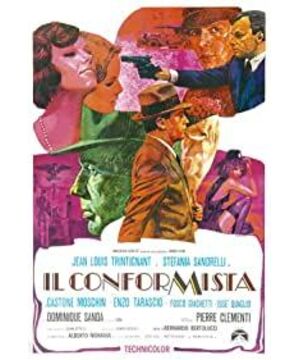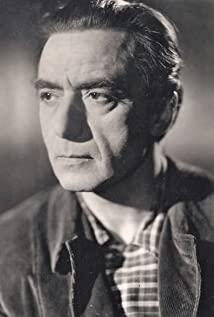"Concurrent"
——Fascism, Marxism, Freudism and others
"The Conqueror" is a complex and beautiful work, a film about a man restraining his desires and morals in order to adapt to a new, powerful and terrifying political movement. It is a highly conscious and bold style of the pinnacle of postmodernism, covering almost all the styles that can be found in recent Italian film history: its narrative contains a classical and powerful force, inherited from neorealism; These schedules are very reminiscent of the kind of architecture-character relationship in Antonioni's movies; the prom scene is almost the same as Fellini.
Soon after the film started, Marcello uttered the key word to understand the whole film-ordinary. Marcello desires to become an ordinary person and gain a sense of normalcy. This idea not only guides all the actions of Marcello, but also guides the audience to understand all the technical aspects of the film. Those modern Nazi structures are reminiscent of the indifferent and alienated modern buildings in Jacques Tati’s images. Certain surrealist scenes and certain scenes in Wells's "The Trial" can bring the same fear. Bertolucci uses composition and time to imprison his character in prison. Those expressionist elements, including the reference to the contrast of light and dark in Caravaggio's paintings, hint at conflicts in the depths of the characters' consciousness. There are also those bright and fancy tones that are almost indistinguishable from "normal". Marcello is acting in this extremely unusual scene and color, and the theme is obvious.
However, there are still a few questions that need to be answered to fully understand what the film is talking about. Why did Marcello become a fascist? Is there anything in common behind him becoming a fascist? First of all, Marcello's experience of being sodomized as a child has a significant impact. This led to his subsequent choices and actions in three senses: 1. The fact that he was raped. 2. Confusion and depression of sexual orientation. 3. The feeling of guilt brought by Marcello killing the driver afterwards. This corresponds to Marcello's three levels of self-salvation actions. When Marcello repented, she said: She was just for making love and cooking. At least for him, his wife is just a symbol, a tool, a tool that hopefully can bring him back to a normal life. But this is far from enough for Marcello, because it does not solve a more personal problem-sexual distress. Until I met the professor's wife Anna, the wildness and beauty made Marcello feel that conquering her could perfectly solve the mainstream life problems and sexual problems, and even eloped to Brazil. But he was overwhelmed by more powerful politics. He became a coward in front of fascists. Seeing Anna being shot in the woods-Marcello became a slave to fascism in a blink of an eye. So why does this correspond to the third point? To understand it at the most superficial level, at least Marcello thinks so. At the end of the film, Marcello met the driver of the year again, and he immediately pushed all the past crimes to him, because in his consciousness, he took the road of fascism completely because of sodomy (and the shooting in memory). The feeling of alienation and guilt brought to him.
Before thinking about the second question, there is actually another question that bothers me. As the Italian Communist Party, Bertolucci was also influenced by Pasolini, and he also chose a very political story, which should have its purpose. Marx revealed that social life is governed by the economic foundation and the class conflicts it caused at a specific historical moment. After the victory of fascism, there was a rethinking of Marxism. Orthodox Marxism believes that the class consciousness of the proletariat is consistent with its social status, so the crisis will stimulate class consciousness and lead to revolution. But the reality is that the workers voted for fascists. Here, it is no longer the economy that determines consciousness, it is precisely the ideology that has a problem. Therefore, Reich combined psychoanalysis with Marxism and used Freud's theory of sexual repression to explain the formation of fascist ideology. First of all, according to the theory of sexual repression, the Oedipus complex causes people to internalize the father as an image of authority. It is precisely because of the existence of this authority that the sublime will not be destroyed by desire. Sexual repression has thus become the only way for higher civilizations. Therefore, in the formation of an individual's authoritarianism, sexual repression is inevitable. This recognition of patriarchal authority will also cause individuals to seek the same image of authority in society. In the modern production structure, the authority of the capitalist replaces the authority of the father. This economic life is connected to family life and constitutes the authoritarianism of the masses, and this relationship will be reproduced through the family. From this point of view, it can explain Marcello's sexual depression caused by sodomy and his decision to defect to fascism.
Similarly, with the development of capitalism, the economic situation of the proletariat has further deteriorated, directly leading to threats to the authority of the father in the family. Of course, Marcello was born into a noble family, which Bertolucci reflects the loss of authority through his father's insanity. Then the image of the father at this time no longer has the authority of the past, and people will find the comfortable state of being supervised by authority—and a powerful "father". This is reflected in the absence of Marcello's father in the film, so it can explain why Marcello is so awed and terrified of fascism.
Of course, there are too many angles that can be analyzed in "The Conqueror", such as female images, etc., here is just a way of reading.
View more about The Conformist reviews











